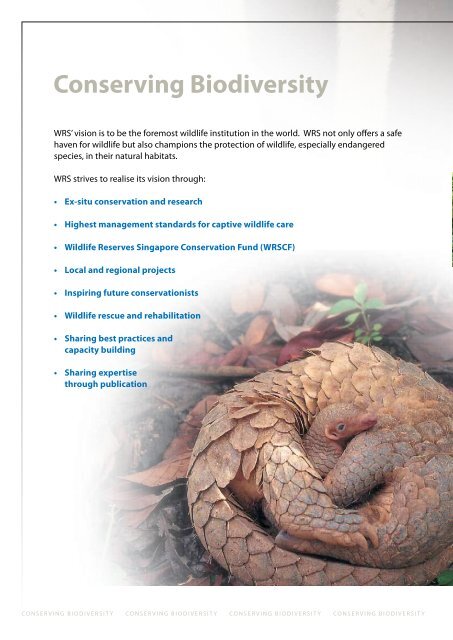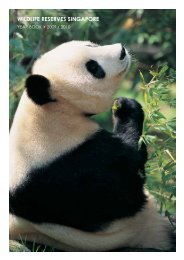Conserving Biodiversity - Wildlife Reserves Singapore
Conserving Biodiversity - Wildlife Reserves Singapore
Conserving Biodiversity - Wildlife Reserves Singapore
You also want an ePaper? Increase the reach of your titles
YUMPU automatically turns print PDFs into web optimized ePapers that Google loves.
<strong>Conserving</strong> <strong>Biodiversity</strong><br />
WRS’ vision is to be the foremost wildlife institution in the world. WRS not only offers a safe<br />
haven for wildlife but also champions the protection of wildlife, especially endangered<br />
species, in their natural habitats.<br />
WRS strives to realise its vision through:<br />
• Ex-situ conservation and research<br />
• Highest management standards for captive wildlife care<br />
• <strong>Wildlife</strong> <strong>Reserves</strong> <strong>Singapore</strong> Conservation Fund (WRSCF)<br />
• Local and regional projects<br />
• Inspiring future conservationists<br />
• <strong>Wildlife</strong> rescue and rehabilitation<br />
• Sharing best practices and<br />
capacity building<br />
• Sharing expertise<br />
through publication<br />
EX-SITU CONSERVATION AND RESEARCH:<br />
Breeding and managing endangered and threatened species in captivity<br />
WRS breeds endangered and threatened species not only to maintain<br />
the animal collection but also to participate actively in animal exchange<br />
programmes with other reputable zoos, enhancing the genetic diversity<br />
of animal collections around the world without drawing on wild<br />
populations. Since 2000, WRS has achieved 375 successful births for 35<br />
endangered species – a testimony to good animal husbandry and excellent<br />
veterinary care.<br />
WRS promotes research on the husbandry and reproductive biology<br />
of various endangered South East Asian animal species that few other<br />
zoological facilities have successfully kept or bred. This team-effort involving<br />
the Zoology and Veterinary staff has proven to be a unique success at the<br />
Night Safari where the Park is the first zoological institution to breed the<br />
Sunda pangolin (Manis javanica) in captivity.<br />
At the Jurong Bird Park we are proud to have succeeded in the artificial<br />
incubation of two great pied hornbills (Buceros bicornis), the yellow-billed<br />
stork (Mycterbia ibis) and the Eurasian eagle owl (Bubo bubo).<br />
For many years WRS has contributed to the conservation of Asian elephants<br />
through animal exchange programmes, research and scientific collaboration.<br />
Night Safari recently celebrated the birth of a male elephant after a hiatus<br />
of nine years. The Park has also collaborated with Perth Zoo on the complex<br />
procedure of artificial insemination to help Australia in its efforts to develop<br />
sustainable captive elephant groups.<br />
<strong>Singapore</strong> Zoo is one of the leading zoological facilities for the captive<br />
management and breeding of endangered Asian primates. Recent highlights<br />
included the births of two Sumatran orang utans (Pongo abelii) and six<br />
critically endangered cotton top tamarins (Saguinus oedipus). <strong>Singapore</strong><br />
Zoo has also been very successful in breeding highly endangered reptile<br />
species such as the Komodo dragon (Varanus komodoensis) and the critically<br />
endangered river terrapin (Batagur baska).<br />
CONSERVING BIODIVERSITY CONSERVING BIODIVERSITY CONSERVING BIODIVERSITY CONSERVING BIODIVERSITY CONSERVING BIODIVERSITY CONSERVING BIODIVERSITY CONSERVING BIODIVERSITY CONSERVING BIODIVERSITY 11







